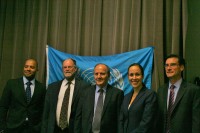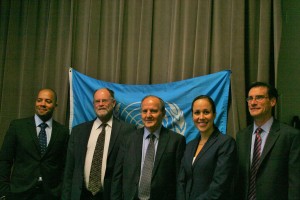
As published by MSN
 The treatment of detainees in jails and prisons in all areas of the world is receiving increased scrutiny. From anti-torture advocates to the U.S. President, stakeholders have been assessing practices including solitary confinement. Juan Méndez, the U.N. Special Rapporteur on Torture and Other Cruel, Inhuman and Degrading Treatment or Punishment, led an examination of the injustices involving confinement at John Marshall.
The treatment of detainees in jails and prisons in all areas of the world is receiving increased scrutiny. From anti-torture advocates to the U.S. President, stakeholders have been assessing practices including solitary confinement. Juan Méndez, the U.N. Special Rapporteur on Torture and Other Cruel, Inhuman and Degrading Treatment or Punishment, led an examination of the injustices involving confinement at John Marshall.
The Sept. 17 program was presented by the United Nations Association of the United States of America, as well as John Marshall’s International Human Rights Clinic and Restorative Justice Project.
Méndez was joined by panelists Alan Mills, executive director of the Uptown People’s Law Center; and Xavier McElrath-Bey, co-founder of Incarcerated Children’s Advocacy Network and an outspoken proponent of restorative justice practices. Their discussion came as greater light is shed on the use of solitary confinement as a means of punishment and deterrence. President Barack Obama recently became the first sitting U.S. president to tour a prison, advocating for the evaluation and reform of incarceration practices across the country.
John Marshall’s IHRC has advocated against confinement and produced research detailing deficiencies in U.S. detention practices. The IHRC’s report, “U.S. Immigration and Customs Enforcement’s New Directive on Segregation: Why We Need Further Protections,” details the use of solitary confinement of immigrant detainees, noting that some U.S. detention facilities have been found to have the worst record on solitary.
The IHRC – joined by the Heartland Alliance’s National Immigrant Justice Center – produced a similar report on the use of confinement among adults seeking safe asylum in the United States. The report found that adults seeking safe asylum in the United States can be subjected to deplorable conditions, physical, sexual and psychological violence.
